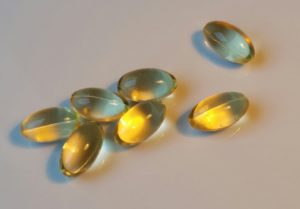 Yesterday's post was about how several well-done large studies did not find the health benefits from vitamin D supplements that the researchers had hoped for. In one of the studies (the VITAL trial) discussed yesterday, Vitamin D supplements did not prevent cancer or cardiovascular events (e.g., stroke, heart attack), which was the focus of the study.
Yesterday's post was about how several well-done large studies did not find the health benefits from vitamin D supplements that the researchers had hoped for. In one of the studies (the VITAL trial) discussed yesterday, Vitamin D supplements did not prevent cancer or cardiovascular events (e.g., stroke, heart attack), which was the focus of the study.
But... one positive finding (in a separate analysis of the study results) did come out of the study: vitamin D supplements reduced the incidence of autoimmune disease by 22% over the 5+ years of the VITAL trial. This included rheumatoid arthritis, polymyalgia rheumatica, autoimmune thyroid disease, and psoriasis.
The more than 25,000 participants (all older than 50 years) took vitamin D 2000 IUs daily or 1 g marine omega-3 fatty acids (fish oil) daily, or both, or none for more than 5 years. Only the vitamin D supplementation (whether taken alone or with fish oil) had a statistically significant health effect.
From Medical Xpress: Study finds vitamin D supplements with or without Omega-3s decreased risk of autoimmune diseases
Autoimmune diseases (AD) such as rheumatoid arthritis, polymyalgia rheumatica, autoimmune thyroid disease and psoriasis, are a leading cause of morbidity and mortality as people age. Few effective treatments are available for AD, but some preclinical studies have hinted that supplements, including vitamin D and omega-3 (or n-3) fatty acids, may have beneficial effects. In a new study published in BMJ, investigators from Brigham and Women's Hospital evaluated whether taking vitamin D and/or omega fatty acid supplements could affect rates of AD. ...continue reading "Vitamin D Supplements and Autoimmune Disease"

 An easy-peasy way to lower your risk for type 2 diabetes may be to not eat late dinners.
An easy-peasy way to lower your risk for type 2 diabetes may be to not eat late dinners.  The CDC (Centers for Disease ) recently released another bit of gloomy
The CDC (Centers for Disease ) recently released another bit of gloomy  Recently the CDC (Centers for Disease Control and Prevention) released the depressing news that very few Americans are eating recommended amounts of fruits and vegetables. Many studies show that eating several servings each day of fruits and vegetables has all sorts of health benefits (e.g., live
Recently the CDC (Centers for Disease Control and Prevention) released the depressing news that very few Americans are eating recommended amounts of fruits and vegetables. Many studies show that eating several servings each day of fruits and vegetables has all sorts of health benefits (e.g., live  Emulsifiers are in many of the processed foods we buy. They are added to the foods to enhance texture and extend shelf life. Animal and human studies find that some emulsifiers (e.g., soy lecithin, carrageenan, polysorbate-80) can promote gut inflammation and alter the gut microbiome in a
Emulsifiers are in many of the processed foods we buy. They are added to the foods to enhance texture and extend shelf life. Animal and human studies find that some emulsifiers (e.g., soy lecithin, carrageenan, polysorbate-80) can promote gut inflammation and alter the gut microbiome in a  We've all been warned over and over to avoid sunlight in order to avoid skin cancer, but... conflicting with that advice are studies linking higher sunlight exposure to lower levels of other cancers,
We've all been warned over and over to avoid sunlight in order to avoid skin cancer, but... conflicting with that advice are studies linking higher sunlight exposure to lower levels of other cancers,  Once again research finds health benefits from consumption of olive oil. A recent
Once again research finds health benefits from consumption of olive oil. A recent  Some good news - a recent
Some good news - a recent  Whether one eats organic foods or non-organic foods does make difference, even when eating a healthy Mediterranean style diet. A recent
Whether one eats organic foods or non-organic foods does make difference, even when eating a healthy Mediterranean style diet. A recent